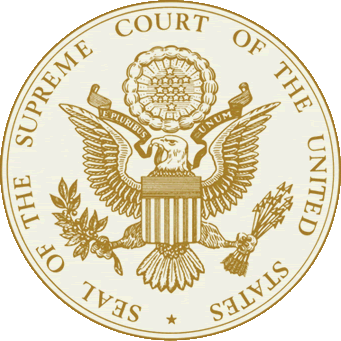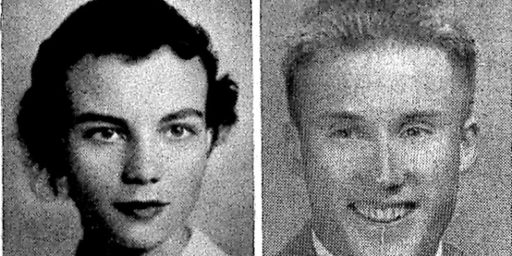36% of all Supreme Court Justices Lacked Judicial Expereince
 FindLaw notes that 40 of the 111 Justices that have served on the Supreme Court of the United States lacked judicial experience prior to ascending to the bench. That equates to 36.03% of all Justices.
FindLaw notes that 40 of the 111 Justices that have served on the Supreme Court of the United States lacked judicial experience prior to ascending to the bench. That equates to 36.03% of all Justices.
This is a a take it for what it is worth kind of factoid, but is interesting nonetheless.
Two observations:
1) Two recent Chief Justices are on the list: William Rehnquist and Earl Warren.
2) The likelihood of picking non-judges clearly has diminished in recent decades. Rehnquist was the last, and he was originally appointed to be an Associate Justice in 1972.
h/t: Media Matters via the Political Wire.




I believe the worm turned on this issue during Nixon’s presidency when he was having trouble getting nominees approved and his Democratic opposition trumpeted the superior qualifications of their best and brightest. In particular, Democrats advanced ABA ratings as the chief signal of qualifications. Nixon decided to use the ABA ratings to promote his ideological picks (racial moderates). Rehnquist was deemed qualified by the ABA, so he was confirmed. The approach of using qualifications to make idealogical picks worked for Republicans and continued with a slight bump for Bork, whose ABA rating was split. I don’t think it’s conceivable for a politician like Howard Taft or Earl Warren to be selected any more.
It seems to me that this is an odd sort of argument. Prior to 1851 no justice of the Supreme Court had a law degree. The last justice without a law degree was appointed in 1941. For most of the court’s history a majority of the justices serving did so without law degrees. Do we think that would be a good idea now? I think the answer is “No”.
The issue is not whether justices have historically had judicial experience or not. It’s completely irrelevant. The pertinent question is whether a justice serving today with the Supreme Court justices currently serving as colleagues should have judicial experience.
I think it’s a legitimate question and worth discussing. I can see arguments both ways.
Historically, the greater number of Supreme Court justices have been white, male, Protestants without law degrees but with prior judicial experience. Times have changed.
Dave: in fairness, I actually didn’t make an argument, just an observation.
You can add one of the most stalwart defenders of the First Amendment, Hugo Black, to that list. As well as Potter Stewart, and the most important Chief Justice in the Court’s history, John Marshall
I think the specific argument being made is that U.S. Courts of Appeals judges are most qualified because they do the type of work most like the work of Supreme Court justices. They both review lower court decisins.
However, the intermediate courts didn’t exist until 1891.
@PD: Oh, there are various arguments being made about this issue, I am just saying I didn’t make one here.
My general position is that judicial experience is not, per se, needed, but some kind of serious legal experience is.
True, but that just points out another oddity about recent Supreme Court Appointments.
One could argue that state Appellate level courts are just as good a training ground for SCOTUS as the US Courts of Appeal, and yet the last time someone went from one of the State Supreme Courts to SCOTUS was Sandra Day O’Connor. Before that, you have to go all the way back to 1932 and the appointment of Benjamin Cardozo
I’m not complaining about you, Stephen. I’m complaining that Findlaw’s bringing this up at all at this point is an implied argument that there’s strong precedent for justices with no judicial experience.
BTW, I think that prior judicial experience is very nearly a prerequisite. We’re a much more specialized society than we were 25, 50, or 100 years ago. Indeed, I think that we should be talking about whether lawyers should go to law school and judges go to judge school. In my view the primary virtue of today’s lawyer, zealous advocacy, is nearly disqualifying for judges.
Does the experience one has and the choices one makes express one’s interests and views? I think it does and it’s as true for lawyers as it is for bricklayers.
Dave,
I agree with you on that last point, but I think it’s time to wonder if that prior judicial experience must only be obtained by being a member of the high priesthood of the Circuit Courts Of Appeal
Actually, I can attest from experience that modern law schools do a better job of training students to be judges and law professors than it does at teaching them the things you really need to know to practice law.
Indeed, it is my understanding that this is especially true of the top law schools, where theory is valued well more than practicing law itself.
I’ve already expressed myself here at OTB about Ms. Kagan’s nomination. I think that, barring some blistering new revelation, she should be confirmed. What I’m asking here is a larger question.
A number of news sources are telling me that Ms. Kagan has wanted to be a judge for decades. Is that credible? Being a judge isn’t particularly difficult. There are thousands of them all over the country.
I can say that I’ve wanted to be an astronaut but if I don’t do the things you need to do to become an astronaut it’s pretty silly. Has Elena Kagan done the things that you should do to become a judge and are those the things that we should want people doing in order to become a judge?
Hey, this may be a little interesting but couldn’t we get just a little coverage of Elena Kagan?
Doug, one of the interesting things about the Rehnquist nomination was that Nixon had previously emphasized that judicial experience was a prerequisite as he sought approval of some state court judges from places like Arkansas and California. The ABA rated these people mediocre, so Nixon pivoted to non-judicial candidates that would be approved.
Rehnquist clearly benefited from knowing lawyers and Congressmen around Washington, who all thought him smart and legally astute. There was no question that he was not qualified by these standards. But these are not standards a judge from Little Rock can hope to meet.
Whatever standards(experience and such not positions held on issues) which are used to qualify or disqualify someone to be a Supreme Court Judge should apply to any nominee by any President, Democrat or Republican.
I honestly think that if one sets asides one’s partisan preferences in a given situation that, in fact, the standards are fairly consistent (with a shift taking place with Bork, but a shift that affected Dem and Rep nominees from that point onward).
Quite frankly, the script is pretty generic and quite predictable.
Dave,
“A number of news sources are telling me that Ms. Kagan has wanted to be a judge for decades. Is that credible? Being a judge isn’t particularly difficult. There are thousands of them all over the country.”
Kagan was nominated to be a Federal Appeals Court Judge in 1999, but the Republicans in the Senate refused to hold a hearing on her during the remaining 18 months of the Clinton Presidency. From her wikipedia entry, “On June 17, 1999, President Clinton nominated Kagan to the U.S. Court of Appeals for the District of Columbia Circuit, to replace James L. Buckley, who had taken senior status in 1996. The Senate Judiciary Committee’s Republican chairman Orrin Hatch scheduled no hearing, effectively ending her nomination. When Clinton’s term ended, her nomination to the D.C. Circuit Court lapsed, as did the nomination of fellow Clinton nominee Allen Snyder.”
If you are going to become a Federal Judge, her career path of serving in the White House Counsel’s Office is one normal way to do so (though less common than having a stint as a prosecutor in the US Attorney’s Office).
Cruder Schuler (and others).
We used to bleed people as part of medical practice. Anyone expect to go to the hospital and get a bleeding today?
Standards change.
My impression still is that the judicial experience discussion is worthy, and that this nominee isn’t receivig, or deserving of, sparkling reviews.
Dave, I’ve thought of your question and been pretty stumped. There are too few SCOTUS justices to make large pronouncements. Kagan went to the right school, graduated magna cum laude, made D.C. connections, wrote some scholarship that wasn’t controversial, and worked with the President.
If she wanted to be just any kind of judge, she would probably just need to go to an in-state law school, get a B average, work for the government, preferably prosecutor’s office, connect up with the favored local political party and let it be known she wants to be a judge.